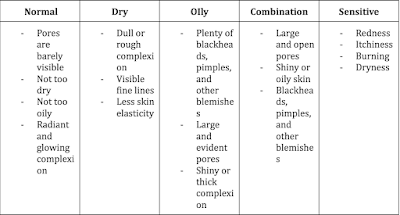By Myrtle Bautista
Photo courtesy of Freepik
There are five (5) common skin types that people typically fall under: oily, dry, normal, sensitive, and combination. The success of your skincare routine depends largely on the products that you use and whether or not they’re compatible with your skin type. So, before putting together a skincare routine, you must determine what skin type you have.
In this article, you will learn how to identify the category that bests describes your situation as well as how to choose skincare products for your skin type. Scroll on to learn more.
How to determine your skin type
Identifying your skin type is a simple process that anyone can do at home. There are two methods that you can use: observation and blotting.
Observation is a pretty straightforward technique. You simply take note of the common indicators of your specific skin type and narrow your choices down as you go.
Here’s a quick chart of the five common skin types and their common signs/symptoms:
Click to enlarge
These are just some of the most common identifiers for the five skin types. If you’re using a blotting sheet, the process may even be easier.
Blotting sheets absorb oil when pressed against the skin. If you wipe and only get a small patch of oil, then your skin type is probably normal. Meanwhile, if there’s too much oil, then it’s oily. If it looks like there’s barely any oil on the blotting sheet, your skin type is probably dry. Finally. if the rest of your face has little oil but your T-zone has an excessive amount of it, then you have a combination skin type.
You’ll know if your skin is sensitive if you experience redness or itchiness with any of your skincare products. You can test it on a small part of your skin before putting it all over your face.
Choosing skincare products for your skin type
Once you’ve done all the work to identify your skin type, it’s time to choose compatible skincare products. If you want to maintain youthful and glowing skin, you’ll need more than just natural sunscreen.
Social media tends to hype up a ton of commercial products nowadays, the majority of which are beauty and skincare products. It’s become too easy to fall for fancy advertisements and chic packaging. When choosing skin care products, it’s much more important to focus on its ingredients than its wrappings.
Photo courtesy of Freepik
Dry skin
When it comes to curing dry skin on your face, cleansing and moisturizing is the best way to go. However, you shouldn’t just get the first cleansing or moisturizing product you see on the shelf.
You’ll want a gentle cleanser and a moisturizer with a good amount of humectants. While they aren’t the best at moisturizing when used in their raw form, humectants can be a great additive ingredient in moisturizers. They help enhance a products’ effectiveness and provide long-lasting moisturization for the skin.
Oily skin
Dealing with oily skin can be challenging. But it’s nothing that regular washing and a gentle cleanser can’t fix. Make sure to do your cleansing at least twice a day and take it easy with the scrubbing as this can irritate your skin. Avoid picking, popping, or squeezing any blackheads or pimples. Furthermore, choose a water-based moisturizer to finish off your evening routine.
Normal skin
People with normal skin are by far the luckiest of the bunch because they don’t need to do anything special to maintain their complexion. However, people with normal skin types can still benefit from a little oil cleansing every once in a while. Oil cleansing has been around for centuries and provides loads of benefits like unclogging pores and rehydrating skin. They’re also quite compatible with almost every type of skincare product.
Combination skin
People with combination skin may have dry skin on some parts of their face and oily on others. Since that is the case, people with this skin type need to use different products for different parts of their skin. For instance, if you have a particularly oily T-zone, you may want to use a water-based moisturizer for that area alone.
Sensitive skin
People with sensitive skin need to identify their triggers and do their best to avoid them to prevent reactions. To make this process easier, getting help from a licensed dermatologist is a wise choice. A professional will have the tools and knowledge to help you easily navigate your triggers. Furthermore, they can give you the best solutions to existing skin issues.
Photo courtesy of Freepik
The bottom line
Skincare is more than just choosing the first bottle of product that you find on the shelf. Every person should carefully consider the ingredients contained within the products they use. Furthermore, they should choose a product that suits their skin type and doesn’t cause unwanted allergic reactions.





No comments:
Post a Comment